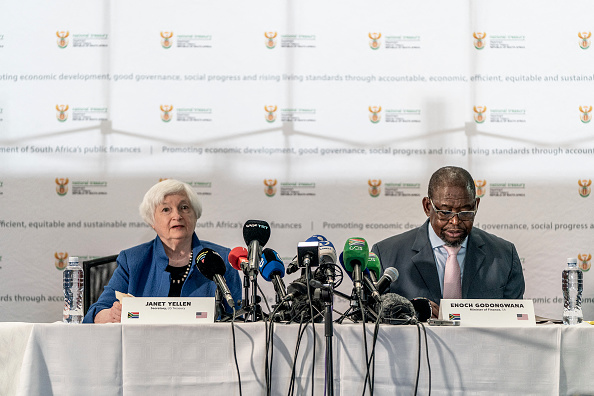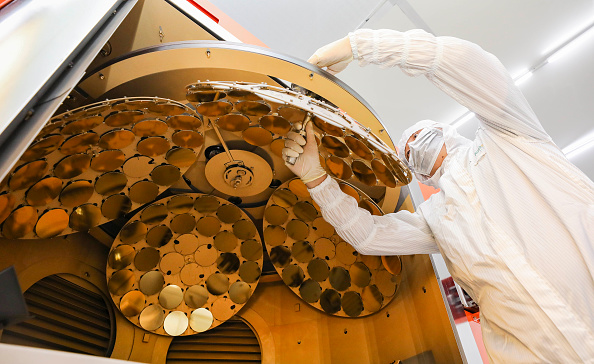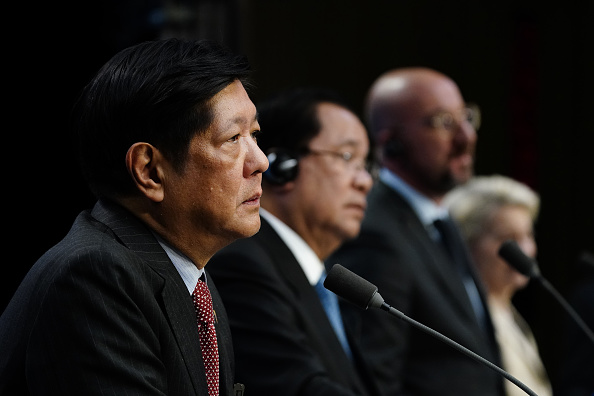
 Spheres of Influence
Spheres of InfluenceU.S. Ambassador to the United Nations Linda Thomas-Greenfield is traveling to Africa this week to advance joint U.S.- African priorities, including security issues, food shortages, humanitarian issues, and climate change. Following December's U.S.-Africa Leaders Summit, Thomas-Greenfield will visit Ghana, Mozambique and Kenya in a bid to underscore the administration's commitment to addressing challenges across the continent.
The trip is taking place while Treasury Secretary Janet Yellen simultaneously tours the continent, visiting Senegal, Zambia and South Africa in an effort to deepen economic ties.
Experts have noted that the administration's strong presence in Africa this week is testament to U.S. concerns over China and Russia's significant and expanding economic, political, and military influence across the Continent. Just days before Yellen visited South Africa, the country welcomed Russian Foreign Minister Sergei Lavrov and stressed its "strong bonds" with China and Russia in advance of the joint naval drills planned for next month.
While visiting Zambia, Yellen stated that it was crucial for Zambia to address its heavy debt burden with China. In response, Beijing issued a statement citing America's "catastrophic debt problem" and accusing it of "sabotaging" other nations' efforts to resolve debt problems.
"The biggest contribution that the U.S. can make to the debt issues outside the country is to cope with its own debt problem," the Chinese embassy in Zambia said in a statement on Tuesday.
 When the Chips are Down
When the Chips are DownJapan and the Netherlands are likely to join the United States in restricting exports of semiconductor manufacturing chips to China, in a multilateral effort to limit its ability to develop advanced technology such as artificial intelligence and military weapons. The new restrictions would also impose restrictions on Chinese companies' ability to produce certain types of advanced chips.
If implemented, this would be a major diplomatic win for U.S. President Joe Biden's administration, which in October announced restrictions against Beijing's access to U.S. chipmaking technology.
As the deal is hammered out in Washington, one major concern for negotiators is a potential slowdown in supply chains as well as possible market retaliation from Beijing. Dutch officials are also concerned that the deal might favor the United States' own chip-making industry, over broader global interests.
Japanese lawmaker Shigeharu Aoyama, who serves on the party's committee covering trade and industry, warned that China will retaliate with force. "China will come back with stronger retaliation and Japanese companies doing business there will probably be damaged," he said.
Learn more in "Moving Forward," an interview with Jeffrey Sachs, international economist and University Professor at Columbia University.
 Calming Seas
Calming SeasAs disputes in the South China Sea continue, Philippine President Ferdinand Marcos Jr. said earlier this week that he proposed to China that the two nations hold talks between their foreign ministers about the disputed waters, with the hopes of quickly resolving any new conflicts that arise. Despite blaming Chinese actions for the ongoing disagreements, Marcos also stated that Chinese President Xi Jinping agreed to his proposal and that they're working to figure out an arrangement.
The Philippine president's statement came just a few weeks after he flew to Beijing to meet with Xi and other top officials in efforts to improve bilateral relations. While there's been renewed friction between the nations over territorial claims in the South China Sea since Marcos came into office, both sides have sought to establish links for diplomats to talk on maritime issues, and have agreed to resume talks on oil and gas exploration in the area.
But despite rocky waters between the two governments, the Philippines is working to bring back Chinese tourists to the country following the end of Beijing's strict COVID-19 curbs.
"The Philippines is open and ready to welcome our friends from China," said Philippine Tourism Secretary Christina Frasco while welcoming hundreds of Chinese tourists who arrived in Manila this week. She also emphasized hopes for the bilateral relationship, saying their "intention is not only to regain but to exceed our pre-pandemic numbers, knowing how the relationship between the Philippines and China will only further improve in the years to come."
Learn more in "Can the Philippines Find a Safe Space Amid U.S.-China Rivalry," by Lucio Blanco Pitlo III, a Research Fellow for the Asia-Pacific Pathways to Progress.
Prepared by China-US Focus editorial teams in Hong Kong and New York, this weekly newsletter offers you snap shots of latest trends and developments emerging from China every week, while adding a dose of historical perspective.
- 2023-01-20 China's Davos Pitch
- 2023-01-13 Strategic Encounters
- 2023-01-06 Common Challenges
- 2022-12-23
- 2022-12-16 All in On Africa
- 2022-12-09 Seeking Stabilization
- 2022-12-02 Turf Tension
- 2022-11-18 Thawing Ties?
- 2022-11-11 Face to Face
- 2022-11-04 The Pacing Challenge
- 2022-10-28 Third Time’s the Charm
- 2022-10-21 United as Steel
- 2022-10-14 Party Time
- 2022-10-07 Elections Incoming
- 2022-09-30 Hot Intrigue
- 2022-09-23 Global Gridlock
- 2022-09-16 Injecting Stability
- 2022-09-09 Cutting Edges
- 2022-09-01 A Win for Global Business
